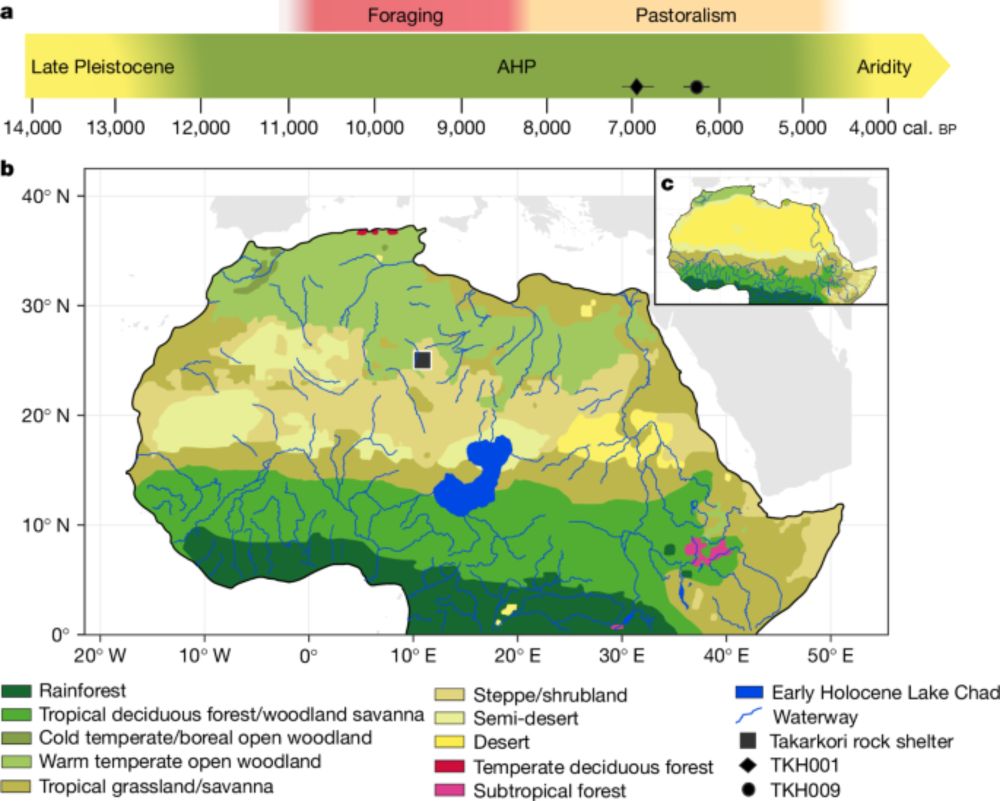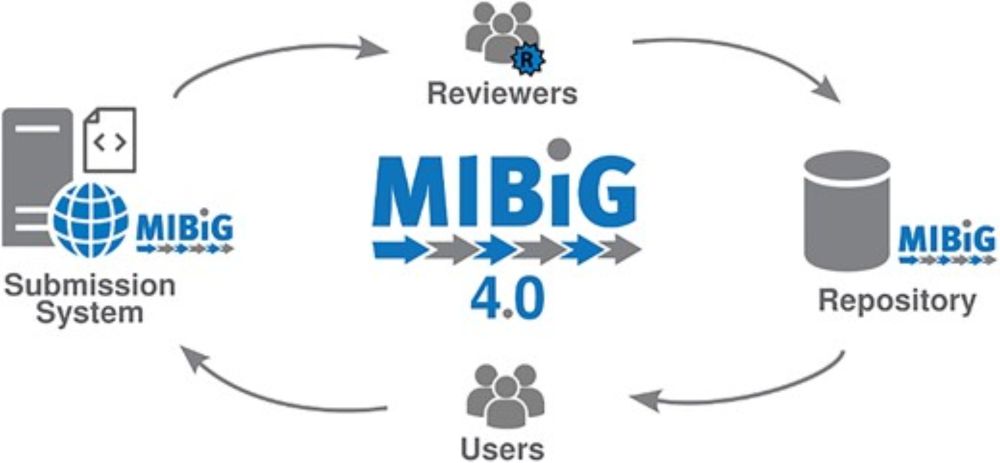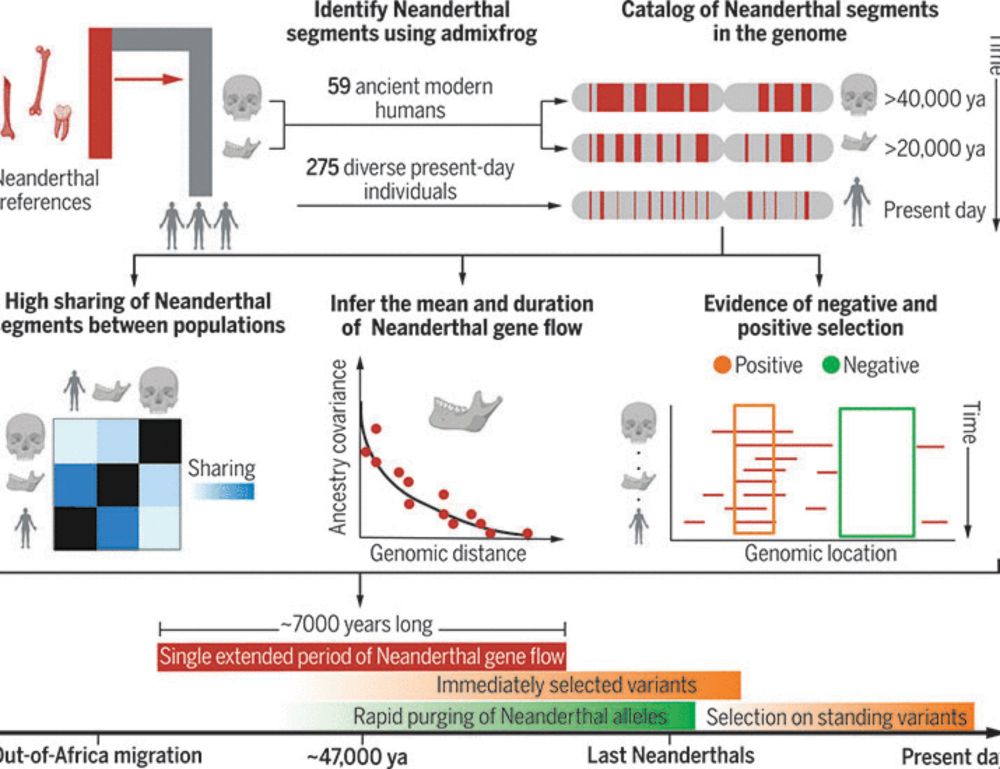I'm very proud of being part of this team, @matejahajdi.bsky.social! Hopefully many more @eshesociety.bsky.social conferences will come!
26.09.2025 19:40 — 👍 6 🔁 0 💬 0 📌 0
The @nytimes.com has rarely felt as hopelessly out of its depth as in the past two days or so. There is still much I admire, many journalists I respect and trust, but on the Charlie Kirk assassination it simply hasn’t been very informative - not to mention some atrocious opinion “journalism”.
13.09.2025 09:35 — 👍 300 🔁 58 💬 12 📌 9

Efficient sequence alignment against millions of prokaryotic genomes with LexicMap - Nature Biotechnology
LexicMap uses a fixed set of probes to efficiently query gene sequences for fast and low-memory alignment.
Sometimes you meet absolutely incredible bioinfo-magicians.
It was a huge privilege when @shenwei356.bsky.social
joined our group for a year on an @embl.org sabbatical.
While here, he developed a new way of aligning to
millions of bacteria, called LexicMap 1/n
www.nature.com/articles/s41...
10.09.2025 09:12 — 👍 189 🔁 99 💬 5 📌 4

Ancient skeletons’ genes reveal origin of the Slavic people
DNA connects modern Slavs to a wave of migration following the fall of the Roman Empire
A study led by @zhofmanova.bsky.social @mpi-eva-leipzig.bsky.social used ancient DNA to investigate the spread of Slavic language and culture 1,500 years ago. “This wasn’t a migration of elites, or a few male warriors,” 1 co-author says. “This was the migration of an entire population.” @science.org
03.09.2025 15:29 — 👍 27 🔁 12 💬 0 📌 0

A huge thanks to all the amazing speakers and participants at #SPAAM7 yesterday 🧬🙌
The sessions were full of inspiring talks and great discussions!✨
27.08.2025 15:45 — 👍 15 🔁 6 💬 1 📌 1
I am so thrilled for this opportunity and to talk about #ancient #pathogenomics!! There is still time to register for #SPAAM7, happening this 26th of August in Turin!! (also online!): join us for a day of #ancient #metagenomics with the welcoming community of @spaam-community.bsky.social
30.07.2025 09:09 — 👍 2 🔁 1 💬 0 📌 0

screenshot of the lyme regis fossil festival pamphlet, showcasing two workshops with a very serious dinosaur reconstruction right next to my really silly duckbilled dinosaur lineart.
Text is:
Saturday 14th June
Paleoart Workshop
10.30-11.30
Dinosaur reconstructions
Jay Balamurugan (Age 10+yrs)
Have you ever wondered about how scientists and artists work together to bring extinct animals to life in illustrations, books, and documentaries? In this workshop, Jay will run through how paleoartists reconstruct dinosaurs and other prehistoric life - from looking at the original fossils and skeletal diagrams to referencing modern animals and their behaviours and ecologies. By the end of the session, we'll have illustrated an iconic local extinct species!
Paleoart Workshop
13.30-14.30
Doodling and colouring corner
Petra Korlevic
(Ages 3-6yrs - accompanied)
A relaxed workshop offering the opportunity to come colour a variety of dinosaurs and other extinct animal themed templates or draw and colour your own. Perfect for a sit down and some downtime in between the hustle and bustle of the event!

an absolutely chaotic scene with 15 different extinct critter prints strewn across my bed as I am trying to sort and cathegorize everything. we got dinosaurs, water reptiles, flying reptiles, almost birds, a t-rex with a crown, all in various states of horizontal/vertical upside-down, cut partially.
find me this weekend at the #LymeRegisFossilFestival Hub point for some chill #SciArt dinosaur coloring/doodling!
11.06.2025 09:19 — 👍 14 🔁 3 💬 0 📌 1
We just succeeded in formally linking a specific rodent species - the otherwise charming fire-footed rope squirrel - to the onset of a mpox outbreak in a primate species - sooty mangabeys. Here Kai’s report on the preprint we released yesterday 1/2
09.04.2025 06:24 — 👍 15 🔁 7 💬 1 📌 2
The next release is out!
09.04.2025 06:33 — 👍 3 🔁 0 💬 0 📌 0

Ancient DNA from the Green Sahara reveals ancestral North African lineage - Nature
Pastoralism spread through cultural diffusion into the Green Sahara, where an isolated, distinct North African ancestry persisted.
I'm beyond excited to share our new paper in Nature! We sequenced the first ancient human autosomal genomes from the Central Sahara, two ~7,000-year-old individuals from Takarkori in Libya, revealing a long-isolated North African lineage: www.nature.com/articles/s41...
Here's a short thread: (1/n)
02.04.2025 16:35 — 👍 141 🔁 46 💬 3 📌 5
Just over 2 weeks left to apply for this 3-y position. It qualifies for the full UK visa sponsorship. Come work with us on a truly exciting project, with visits to different #museums #aDNA #popgen
10.03.2025 18:24 — 👍 8 🔁 6 💬 0 📌 0

Last week’s AncientMetagenomeDir hackathon was a great success 🚀. More than 20 participants added new studies, updated the documentation, fixed bugfixes, and added the first 14C dates to the study 💪!
14.02.2025 15:41 — 👍 0 🔁 1 💬 1 📌 0
The Human Fossil Record: A Digital Resource for Research and Education
The Human Fossil Record: A Digital Resource for Research and Education
The Tai Chimpanzee Project is making available microCT scans from their collections on human-fossil-record.org. All proceeds are used to support their mission of conservation and non-invasive research in Tai National Park (taichimpproject.org).
13.02.2025 07:50 — 👍 17 🔁 17 💬 1 📌 1

Caption by professor B Gronnow.
Water color by Nuka Konrad Godtfredsen (2021). Copyright: The National Museum of Denmark.
"Hunting a herd of swimming caribou from kayak at the site, Aasivissuit, in the early 18th century West Greenland as interpreted by the Greenlandic artist, Nuka Godtfredsen. Through communal drive hunts the Inuit secured large amounts of caribou meat and fat for consumption as well as hide and antler for raw materials and trade. Large heaps of bones from the butchering of the animals piled up as waste in the midden area of the settlement, Three centuries later archaeologists excavated the bones, which were analyzed, including studies of preservation conditions of ancient DNA contained in the bones and soil."
New paper out! 📄
My first adventures in (ancient) metagenomics. 🦠
“Exploring DNA degradation in situ and in museum storage through genomics and metagenomics” www.nature.com/articles/s42...
Curious about the water color painting (see ALT text)? 🦌
Thread (Bluetorial?) with findings!
🧶👇 (1/n)
12.02.2025 13:05 — 👍 56 🔁 19 💬 1 📌 2

Edmond Albius was just a 12-year-old boy, enslaved and without formal education, in 1841. He managed to develop an innovative technique to pollinate vanilla orchids quickly and profitably, solving an enigma that intrigued prominent botanists of the time. (The rest in comments)
02.02.2025 21:59 — 👍 6 🔁 3 💬 6 📌 0
If you like hearing about #aDNA of animals by Early Career Researchers - join us at AaRC for our seminar series, on the last Friday of every month!
29.01.2025 17:52 — 👍 7 🔁 8 💬 0 📌 0
Please join us for our AncientMetagenomeDir hackathon!
24.01.2025 16:22 — 👍 1 🔁 0 💬 0 📌 0
I second this. In our lab, the majority of the pipelines are written in Nextflow as part of the nf-core initiative and they are easily deployable. However, I don't use Groovy to write a simple workflow to test something quickly, but do it in Python. So Snakemake is sort of a prototyping tool for me.
22.01.2025 22:26 — 👍 2 🔁 0 💬 0 📌 0

We're searching for a database and lab manager to work at U Notre Dame on the Amboseli Baboons! Please circulate and apply! 🐵 🖥️ 🐵 🖥️ docs.google.com/document/d/1...
@jennytung.bsky.social @jbsilk.bsky.social @amboselibaboonrp.bsky.social @matthewzipple.bsky.social @awfuldodger.bsky.social
20.01.2025 08:30 — 👍 13 🔁 20 💬 0 📌 0
AncientMetagenomeDir - hackathon (Feb 2025) · SPAAM Community
We are back! 🧬 Do you want to help to make easier to find the data of #AncientMetagenomics samples? On the 7th of February 2025 we will have our next AncientMetagenomeDir hackathon (www.spaam-community.org/events/news/...) 🧵 [1/4]
15.01.2025 11:40 — 👍 2 🔁 3 💬 1 📌 1
In Top10 @ScienceMagazine 2024 breakthroughs of the year: Reconstructing ancient pedigrees + IBD segment sharing in aDNA. 😮😊 🎉
Great write-up by @spoke32.bsky.social ! 👏👏
30.12.2024 15:59 — 👍 12 🔁 4 💬 0 📌 0
mtDNA-Server 2 - Mitoverse
Publishing software is often easier than maintaining it - but we’re committed to keeping ours up to date! 🛠️ We've enhanced the documentation for our mtDNA variant calling pipeline, with detailed guides for both graphical and command-line use with Nextflow:
mitoverse.readthedocs.io/mtdna-server...
28.12.2024 16:59 — 👍 6 🔁 4 💬 1 📌 0

Postdoctoral researcher on ‘Unveiling the Ocean’s plastic time capsule"
📢 Interested in micro and nanoplastic research? New exciting post doc opportunity at NHM Denmark working with me and Elvis Genbo Xu reconstructing past plastic levels using historical samples. Deadline for applications 17th Jan!
jobportal.ku.dk/videnskabeli...
23.12.2024 22:33 — 👍 9 🔁 11 💬 0 📌 2

A timeline titled "The Golden Age of Antibiotics" shows when each antibiotic drug class was first available for medical use, with example antibiotics labeled. Classes are color-coded by their source: actinomycetes, other bacteria, fungi, or synthetic. Milestones include the first antibiotics (arsphenamines in 1910), as well as the discovery of many actinomycetes-derived antibiotics, such as streptomycin, and sulfonamides, penicillins, and tetracyclines. Data: Hutchings, Truman, Wilkinson (2019). Created by Saloni Dattani for Our World in Data.
Many people talk about the "Golden Age of Antibiotics", but I hadn't seen it visualized properly.
Just how many types of antibiotics were discovered during that time?
So, I visualized it myself!
23.12.2024 10:08 — 👍 1110 🔁 382 💬 24 📌 23

"You have to think about this race like eating an entire pizza. You know you can do it but you have to cut it into manageable slices, and eat it one slice at a time. And then next thing you know, there's only a slice left." -- Simon Donato
🧪🎅 12 Days of Tools for Science Management 🦠🎄
Day five: Pomodoro tracking
Writing doesn't come naturally to me so I need every trick I can find. Pizza slicing* (i.e. breaking down tasks into small chunks) is one way I can convince myself to get words to paper.
15.12.2024 19:41 — 👍 7 🔁 2 💬 1 📌 0
Earliest modern human genomes constrain timing of Neanderthal admixture - Nature
Nature - Earliest modern human genomes constrain timing of Neanderthal admixture
I am very happy to share our new paper on the genetics of some of the first modern humans who ever lived in Europe! We sequenced nuclear DNA from 13 specimens from Ranis in Germany, and found that they belonged to at least 6 individuals. www.nature.com/articles/s41... (1/n)
12.12.2024 19:00 — 👍 276 🔁 110 💬 12 📌 17

MIBiG 4.0: advancing biosynthetic gene cluster curation through global collaboration
Abstract. Specialized or secondary metabolites are small molecules of biological origin, often showing potent biological activities with applications in ag
Are you working on natural products? We’ve just released version 4.0 of the MIBiG data standard and repository! It now includes 3059 biosynthetic gene clusters, thanks to the combined efforts of 288 expert contributors. A thread: (1/8) academic.oup.com/nar/advance-...
10.12.2024 08:05 — 👍 92 🔁 53 💬 4 📌 12
Anthropologist at the Max Planck Institute for Evolutionary Anthropology. https://www.eva.mpg.de/ecology/staff/heidi-colleran/ Culture | Demography |Reproduction | Population | Existential dread. Humanist and scientist. Writing a book THE FACTS OF LIFE
Postdoctoral researcher at Centre for palaeogenetics | Tracing the evolution of microbes-host interactions across time. Paleovirology, metagenomic, evolutionary genomics 🧬🦣🐝🦠
Microbiome and RNA. Postdoc at Till Strowig Lab Helmholtz HZI. Former Jörg Vogel Lab Helmholtz HIRI. Alumni @UniBarcelona
Marie Skłodowska Curie #postdoctoral fellow at the Segata Lab of Computational #Metagenomics @cibiocm.bsky.social, University of Trento, Italy. Major research topics: #microbiome & #microplastics.
https://gfackelmann.github.io/
PI at Bio2Q - Keio University in Tokyo
https://bio2q.keio.ac.jp/
Microbiome, Computational Biology, Evolution
Palaeoanthropologist @ Natural History Museum, London. Interested in reconstructing human behaviour from their bones
UKRI Future Leaders Fellow and Group Leader in Microbial Genomics at UCL Genetics Institute @ugiatucl.bsky.social.
Reconstructing the evolution of us and our pathogens past, present and future using large-scale genomics.
https://www.ucl.ac.uk/~ucbpvan
Antimicrobial Resistance Research and Epidemiology
Working for Doctors without Borders #MSF
Former: #WHO #LSHTM #MarieCurieFellowship
#AMR #medsky #episky #microsky #aidsky #idsky
Postdoc at @geneticscam.bsky.social . Mathematical population genetics, ancient sedimentary DNA, molecular ecology
Postdoc @ Universität Zürich | genomics & genetics | human evolutionary & adaptive history | dangliu.github.io
Mexican Historian & Philosopher of Biology • Postdoctoral Fellow at @theramseylab.bsky.social (@clpskuleuven.bsky.social) • Book Reviews Editor for @jgps.bsky.social • #PhilSci #HistSci #philsky • Escribo y edito • https://www.alejandrofabregastejeda.com
Senior Researcher @InfoOiip | Lecturer @univienna | Co-director at Center for Advanced Studies of Southeastern Europe @cas_see_uniri | Member of @BiEPAG | Autor von „Ankommen“ (Kremayr&Scheriau)
Nieman Fellow @Harvard ('26) & chairman Netzwerk Recherche
previously: head of investigative cooperations NDR, WDR, SZ; EIC BuzzFeed News DE; co-founder Correctiv; alum Columbia Journalism School
Newsletter “Dreppers Woche”: steady.page/danieldrepper
We support #MaxPlanck researchers in founding science-based #startups by transforming cutting-edge #research into real-world solutions and incubating #innovation together.
➔ 𝗔𝗣𝗣𝗟𝗬 𝗡𝗢𝗪: http://www.maximize-incubator.com
Chartbook Substack https://adamtooze.substack.com/
OnesandTooze podcast https://foreignpolicy.com/podcasts/ones-and-tooze/
C******* University historian, Director European Institute, Chair Cttee on Global Thought.
Economics, history, theory, politi
Associate Professor
DFCI & HMS

















